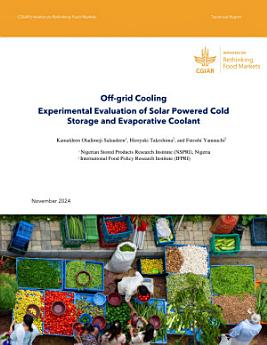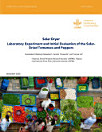Off-grid cooling experimental evaluation of solar powered cold storage and evaporative coolant
Salaudeen, Kamaldeen Oladimeji · Takeshima, Hiroyuki · Yamauchi, Futoshi
Jan 2025 · Intl Food Policy Res Inst
Ebook
33
Pages
family_home
Eligible
info
reportRatings and reviews aren’t verified Learn More
About this ebook
This study compared the postharvest storage potentials of a solar-powered cool room and an off-grid metal-in-wall evaporative coolant. Temperature drop and relative humidity (RH) increase were used to assess the performance of cooling systems. The metal-in-wall evaporative coolant's cooling efficiency was measured. Tomato (UTC variety), Orange (Dan Benue variety) and Carrot (Orange Chantenay) were procured from the international fruits market in Duste, Jigawa State, Nigeria. The products were sorted and stored in three different storage conditions: room temperature (RT), solar powered cool room (SCR), and wall-in-wall evaporative coolant. Mass loss, color, firmness, total soluble solids and titratable acids, carotenoids, vitamin C, marketability percentage, and rate of nutrient degradation were among the quality characteristics assessed. The temperature was lowered to 17.24 °C by the metal-in-wall evaporative coolant, which was far lower than the room temperature (29.19 °C). Evaporative coolant's relative humidity rose from 69.84 to 83.91% while its average cooling efficiency was 60.79%. The average temperature and relative humidity of the solar-powered cool room were 10.45 °C and 86%, respectively. Fruit quality was significantly (p < 0.05) impacted by storage techniques, variations in stored fruits, and storage duration. Compared to the other treatments, the solar-powered cool room preserved the color, mass, firmness, TA, TSS, carotenoids, and vitamin C of all the fruits that were stored there. Fruits kept in a solar-powered cool room had the lowest incidence of nutrient deterioration and the highest percentage of marketability. But in contrast to the room temperature, metal-in-wall evaporative coolant had a slower rate of change in all the evaluated attributes and was able to maintain the freshness of the stored fruits for 18 days. This implied that in remote communities without power, the metal-in-wall evaporative cooler is a substitute method for preserving postharvest quality and extending fruit shelf life.
Rate this ebook
Tell us what you think.
Reading information
Smartphones and tablets
Install the Google Play Books app for Android and iPad/iPhone. It syncs automatically with your account and allows you to read online or offline wherever you are.
Laptops and computers
You can listen to audiobooks purchased on Google Play using your computer's web browser.
eReaders and other devices
To read on e-ink devices like Kobo eReaders, you'll need to download a file and transfer it to your device. Follow the detailed Help Center instructions to transfer the files to supported eReaders.





